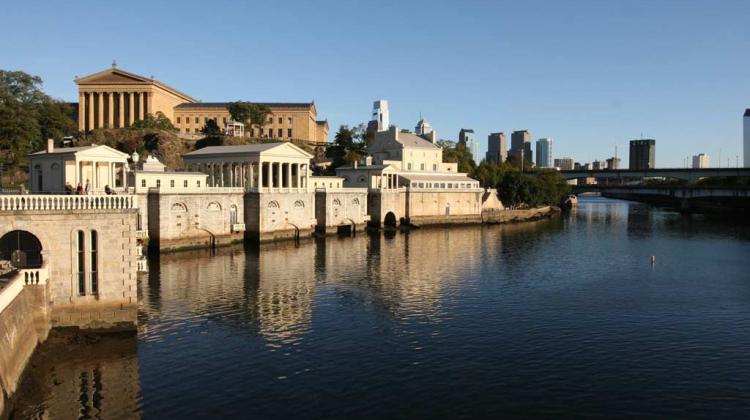Ecological Urbanism Seminar

Ecological Urbanism weds the theory and practice of city design and planning, as a means of adaptation, with the insights of ecology and other environmental disciplines. Ecological urbanism is critical to the future of the city and its design: it provides a framework for addressing challenges that threaten humanity, such as climate change, rising sea level, and environmental and social justice, while fulfilling human needs for health, safety, and welfare, meaning and delight. The class applies an historical and theoretical perspective to the solution of real world challenges.
Image credit: Erica Simmons "Philadelphia Waterworks", 2012.
By Year
2022 - Green Gentrification: Dilemma and Solutions
In fall 2022, the class focused on "green" gentrification, a process whereby public investment in green infrastructure and other environmental improvements in low-income neighborhoods attracts wealthier residents and leads to speculation, increased property values, and displacement of low-income residents. Class participants sought solutions to the dilemma: how to improve a place and, simultaneously, protect the long-term tenure of low-income residents.
Green gentrification is happening across the US, but the practicum concentrated on the Mill Creek neighborhood in West Philadelphia, where Green City, Clean Waters, a landmark green infrastructure program, may threaten low-income communities. After more than a half century of redlining and disinvestment, capital is flowing into West Philadelphia's low-income, predominantly African-American neighborhoods. This private investment is happening simultaneously with public investment in green infrastructure projects designed to improve environmental quality and provide local amenities. These neighborhoods are in dire need of investment, but how can this be accomplished without displacing families who have made their homes there for generations?
Working with community partners, the class developed an action plan to address this crisis: a plan for public investment in green infrastructure, which simultaneously protects the tenure of current residents. The class builds on more than three decades of action research in the West Philadelphia Landscape Project and the experience of local community activists.
2021 - Preventing Displacement from Green Gentrification
MIT's Spring 2021 seminar on Ecological Urbanism focused on the conundrum of green gentrification, a process whereby public investment in green infrastructure and other environmental improvements in low-income neighborhoods attracts wealthier residents and leads to speculation, increase in property values, and displacement of residents. The class sought solutions to this dilemma: how to improve a place and, simultaneously, protect the long-term tenure of low-income residents.
Led by Professor Anne Whiston Spirn and community activist Frances Walker, with the assistance of Lizzie Yarina, seven MIT students created a set of inter-related projects designed to prevent displacement of current residents. The focus of our work was the West Philadelphia's West Mill Creek neighborhood, where the City of Philadelphia plans to reconstruct a recreation center and install green infrastructure to detain stormwater and reduce combined sewer overflows. The recreation center and associated playfields lie atop the old Mill Creek sewer, the site of a catastrophic cave-in in 1961, which resulted in the loss of lives and destruction of 111 homes. The Mill Creek neighborhood, whose population is virtually all African-American and which has been plagued by redlining for more than 80 years, has been subject to speculation, predatory lending, and gentrification in recent years.
2018, 2019 - Holding Ground: Reclaiming the Landscape of Community
MIT's Fall 2018 and 2019 seminar on Ecological Urbanism focused on the crisis facing West Philadelphia's low-income homeowners. After more than a half century of redlining and disinvestment, capital is flowing into West Philadelphia's African-American neighborhoods, and owners are losing their homes through predatory lending (reverse-redlining) and unscrupulous practices of aggressive speculators. To make matters worse, tangled deeds make it difficult for heirs to claim a deceased relative's property. These neighborhoods are in dire need of investment, but not through tricking and cheating residents out of their homes. These problems are not just Philadelphia's, they are happening across the US.
The class, led by faculty Anne Whiston Spirn and Karilyn Crockett (2019), with the assistance of Ben Turpin (2018) Jenny Chen (2019), developed action plans to address this crisis, in partnerships with Monumental Baptist Church and its community development corporation.
2015 - Philadelphia Green Schools, Thriving Neighborhoods
MIT’s Fall 2015 seminar on Ecological Urbanism focused upon highlighting and creating opportunities to connect and empower Philadelphia’s public schools, agencies, and neighborhoods. Seminar participants drew together three mutually supportive movements – green schoolyards, community schools and place-based education – to suggest powerful programs, partnerships and outcomes. Led by Professor Anne Whiston Spirn, with the assistance of Mami Hara, fourteen students from MIT, Harvard, Wellesley and Mass College of Art created a set of inter-related projects intended to amplify the impact of several concurrent opportunities to address Philadelphia’s public education crisis. Those opportunities include:
- Growing and compelling evidence demonstrating the educational effectiveness of community schools and place-based education
- Significant community interest in both green schoolyards and community schools
- Demonstrated results from local partnerships between public schools, universities, businesses and individuals
- Accelerating requirements in meeting the City's stormwater management obligations via green infrastructure
- Innovative funding opportunities
- New sustainability commitments by the School District of Philadelphia, expressed in its recent Green Futures plan
- Local expertise in developing university-assisted schools
- Newly developed curricula capitalizing upon green schoolyards
- Increasing familiarity with technology enabled sharing economies
- Recognized need to increase training, job readiness and other adult education opportunities within neighborhoods, within convenient reach


